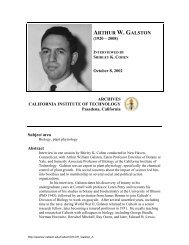Interview with Thomas A. Tombrello - Caltech Oral Histories
Interview with Thomas A. Tombrello - Caltech Oral Histories
Interview with Thomas A. Tombrello - Caltech Oral Histories
You also want an ePaper? Increase the reach of your titles
YUMPU automatically turns print PDFs into web optimized ePapers that Google loves.
<strong>Tombrello</strong>–50<br />
philosopher? And he had a theory of justice, part of which was that in a just society people will<br />
accept inequality to the extent they derive some benefit from it.” I said, “And the problem is to<br />
quantify how much inequality they’ll accept.” The guy looks at me and says, “There’s a name<br />
for people like you, Tom.” I say, “Well, what?” He says, “Child abuser.” I said, “Well, Myron,<br />
one of the kids—not the brightest kid but a very bright kid—gets the idea he can use the Black-<br />
Scholes option pricing theorem—for which you have just won the Nobel Prize—to solve it<br />
where the inequality is the option price.” First he sits there, and then he says, “What’s the name<br />
of that kid?” [Laughter] No more talk of child abuse. [Laughter]<br />
<strong>Caltech</strong> students can take a lot of abuse. They do interesting things. That’s one of the<br />
nastier problems, and yet I’ve asked it now twice, and the second time, a student named Michael<br />
Woods—he graduated a couple of years ago [BS 2008]—came up <strong>with</strong> a very interesting<br />
approach. Remember, now it’s been long enough that the memory of the first edition of the<br />
problem is pretty much gone. He says, “I don’t know how much inequality they’ll accept. But I<br />
know how big an insurance premium a parent will pay to make sure that their kid doesn’t suffer<br />
inequality.” And he says, “It is the amount they are willing to put into the kid’s education. And<br />
from my personal case, I can give it to you almost to the penny.” But the interesting thing about<br />
the solution is that it can be put into a form that is independent of culture. In Sweden, you’re not<br />
paying tuition, but you’re paying high taxes, so you can still figure out how much they’ve been<br />
willing to pay. In some societies, it’s paying taxes. In some, it’s saving for college. In some it’s<br />
taking loans. “How big a price?” It’s quite a brilliant idea. I wish Michael had worked more on<br />
it, but it was certainly enough to get him into the course.<br />
ASPATURIAN: How do you come up <strong>with</strong> these questions?<br />
TOMBRELLO: I read something and I think: I bet that would be something they would find<br />
challenging. The ideas come from everywhere. There was one time when I guess I must have<br />
been in Boston going down to Schlumberger in Connecticut. I was on highway 84, which you<br />
pick up in Hartford and as it goes down to Brewster, and if you’re going to Schlumberger you<br />
get off a little bit before Brewster. As I sailed through Hartford, I thought, “I’m going to be<br />
early.” And then suddenly, it’s as if traffic congealed. So I think, “Boy, there must be one hell<br />
http://resolver.caltech.edu/<strong>Caltech</strong>OH:OH_<strong>Tombrello</strong>_T

















